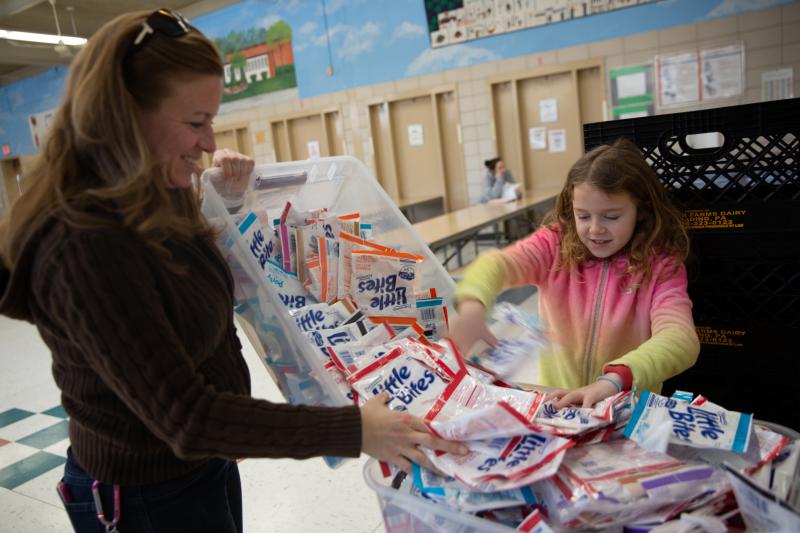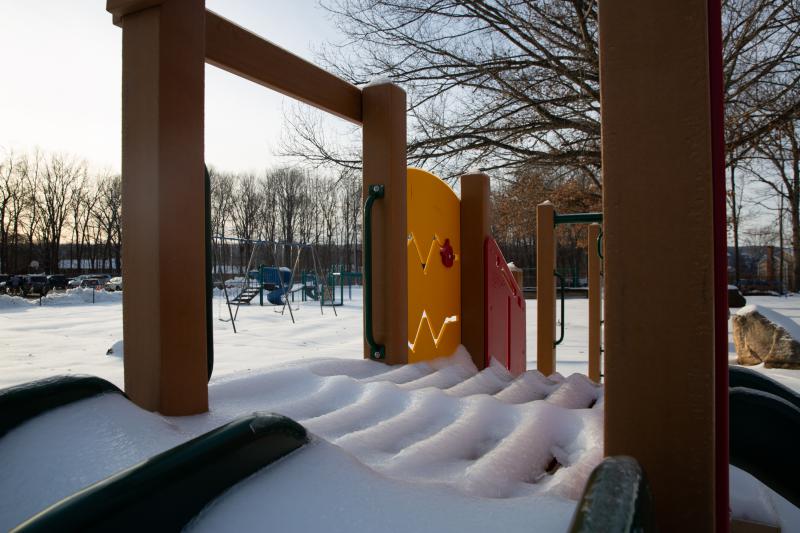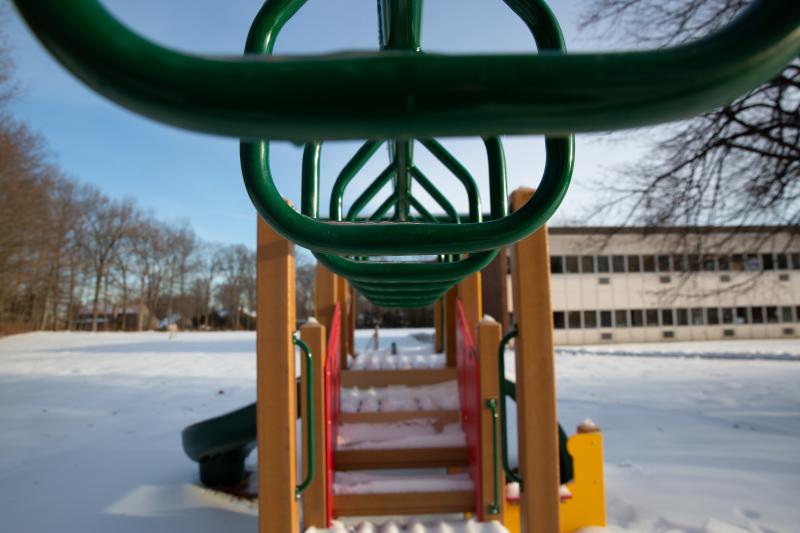Third-grader Emma Hallett helped her mom manage the recycling bins, which were set up along a wall at the back of a noisy cafeteria at Kelley Elementary School in Southington.
"It's the right thing to do," Emma said. "And you can use it, like you can reuse it. I have one in my backpack right now."
Emma had a snack in her backpack that she hadn't eaten yet. After she eats it, the wrapper's going in the bin. She likes the idea that her school is keeping trash out of landfills. Plus, the best part about the recycling program?
"You can make something new with what you use," Emma said.
Only about a quarter of all waste in the U.S. is recycled, according to the Environmental Protection Agency. These days recycled materials are used for everything from handbags and toys, to coffins, bricks, automotive parts, and playgrounds.
You wouldn't know it if you just walked up to it, but one of the playgrounds at Kelley Elementary is made of recycled materials -- and about a third of it is from old toothbrushes and floss containers.
"I want to say it was like 5,000 pounds or something like that, I don't remember the exact number," said Emma’s mom, Kristen Curley, who heads the school's competitive recycling programs. "No, I didn't get too many comments about, you know, that might be gross."
The school didn't have to pay for the playground, either. That's because the community collected enough recycled oral care waste to win second-place in a nationwide contest. The playground's worth about $40,000.
"We sent in over 60 pounds of packaging," Curley said. "I know that 60 pounds doesn't seem like a lot -- but when you're talking about garbage, something like a Colgate box, it doesn't even weigh an ounce. So there was a lot of product that was sent back to TerraCycle for Recycling."

Kristen Curley and her daughter, Emma, sift through recyclables at Kelley Elementary School in Southington.
CREDIT DAVID DESROCHES / CONNECTICUT PUBLIC RADIO
TerraCycle is a New Jersey company that takes recyclables and creates other stuff.
"Our philosophy or mission is to eliminate the idea of waste," said Maame Mensah, who runs the recycled playground challenge for the company. "To do that, we have been focused on your hard-to-recycle waste."
Mensah said it's possible that Kelley's playground includes recycled oral care stuff that actually came from the school.
"It's like washed, and then shredded, and then melted into plastic pellets, or melted into extruded plastic lumber, which is then used for various recycled products, such as benches, picnic tables, playgrounds," Mensah said.
Kelley Elementary has been participating in different recycling programs and competitions for close to a decade. They have a couple of different, what they call, brigades -- one is for juice pouches. One is for specific snack packages. And of course, the oral care waste.

A view from inside the playground.
CREDIT DAVID DESROCHES / CONNECTICUT PUBLIC RADIO
The school's able to essentially sell its recyclables, said parent Kristen Curley.
"The money goes to the PTO and all the money that the PTO raises we use to send them on field trips, and you know, all the other programs, the cultural events, anything that the PTO needs to spend the money on," she said.
Teachers also use the program as a way to teach kids about broader issues related to consumption and the environment.
"The students learn about recycling," Curley said. "They learn about earth conservation. They learn that, you know, a lot of this packaging is kind of unnecessary. They learn about what happens to it. They learn about manufacturing and how the products can be reused from their garbage to make new items, and you know, they learn about involvement with each other because they came together on a project themselves."
But she also said that maybe -- because it's a competition -- there's an incentive for the students to consume more, so that they generate more stuff to recycle.
"And I don't doubt that students were telling their parents that they were done with the toothpaste tube prematurely, and brushing their teeth quite often," she said.
Occasionally they’ll even get a full toothpaste tube. That goes straight to the local food pantry, where it’ll eventually get used by a family in need. Then maybe that empty tube will find its way back into the school’s recycling bin.
 VIEW SLIDESHOW 1 of 3This playground is made of recycled materials, and about a third of it is from recyled oral care waste.DAVID DESROCHES / CONNECTICUT PUBLIC RADIO
VIEW SLIDESHOW 1 of 3This playground is made of recycled materials, and about a third of it is from recyled oral care waste.DAVID DESROCHES / CONNECTICUT PUBLIC RADIO

